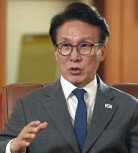Transition Committee Confirms Five Metropolitan and Two Special Economic Zones
Transition Committee Confirms Five Metropolitan and Two Special Economic Zones
Posted January. 25, 2008 08:15,
South Korea will be reorganized into five metropolitan economic zones and two special economic zones. It will be inevitable for many business cities, which the current government has ambitiously promoted, to undergo significant changes.
The presidential transition committee announced on Jan. 24 that it will promote the creative development of metropolises strategy, which regroups South Koreas territory into five metropolitan economic zones of the capital zone, Chungcheong zone, Honam zone, Daegyeong zone, and Dongnam zone and two special metropolitan economic zones of Gangwon zone and Jeju Special Autonomy. This does not alter the existing administrative sectors but defines economic zones centering on key cities with population of around 5 million and combined with industry, education, medical service and culture.
▽ Prepares New Areas for Development
Seoul, Incheon and Gyeonggi will be included in the capital zone, Daejeon and Chungcheong provinces in Chungcheong zone, Gwangju and Jeolla provinces in Honam zone, Daegu and North Gyeongsang Province in Daegyeong zone, and Busan, Ulsan and South Gyeongsang Province in Dongnam zones.
Gangwon zone was designated as a special metropolitan economic zone so that it can be developed with Daegyeong zone, Chungcheong zone, or the capital zone when necessary. The transition committee expects that the regrouping of economic units into metropolitan economic zones will enable cities within each unit to jointly promote various projects without being limited to the boundaries of administrative sectors.
Park Hyeong-jun, a member of the planning and coordination division of the transition committee, said, It is difficult for Ulsan to secure additional business lands within its own administrative sector, but such difficulty can surmounted when it is developed with South Gyeongsang Province.
The transition committee plans to give incentives on cooperative projects among regions, such as subsidizing various infrastructures and providing more national aides or regional grants.
It also decided to eliminate regulations related to business complexes and designate key positions of new development engines in each metropolitan economic zones such as the tentatively named Saemangeum base for free global economy.
In addition, the transition committee will promote projects including building more highways between metropolitan economies, executing early completion of the Honam high-speed railway by 2012, and creating special zones for tourism and leisure in underdeveloped regions such as the boundary between South and North Koreas.
To do so, the transition committee is considering establishing a metropolitan headquarter in each region that can coordinate disputes between autonomies and the special financing of metropolitan economies supported by the subsidies and grants from related administrations.
▽ Abolition of Balanced National Development Plan
This metropolitan economic zone strategy was triggered by the criticisms that the balanced national development plan promoted by the current government caused the public institutions to be scattered and stationed mechanically and induced conflicts between the capital zone and other provinces. Therefore, some argue that the balanced national development plan, symbolized by the exiting administrative multifunctional cities, innovation cities, and business cities, has been abolished in five years. Regarding this, committee member Park said, Reversing the plan for innovation cities will cause confusions. We are not considering full alterations of the conventional plans.
However, considering that the metropolitan economic zone will cover administrative cities or innovation cities, it is likely that the contents of the development plan will be partially altered though the format is maintained.
In relation to the business cities, committee member Park hinted that the development plan will be altered, saying, It had little effects to start with. Although it is attracting businesses, it is showing a bad performance.
koh@donga.com





![[천광암 칼럼]장동혁은 대체 왜 이럴까](https://dimg.donga.com/c/138/175/90/1/wps/NEWS/IMAGE/2026/02/22/133399127.1.jpg)

